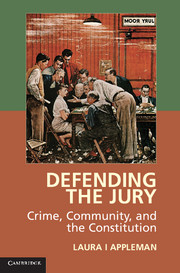Book contents
- Frontmatter
- Contents
- Acknowledgments
- 1 Introduction
- Part I History in the Crucible: Rediscovering the Original Community Right in Criminal Justice
- 2 The Collective Jury Right and the Sixth Amendment
- 3 The Supreme Court and the Reaffirmation of Community
- Part II Old Becomes New: Sixth Amendment Jury Rights and Twenty-First-Century Criminal Procedure
- Part III Theory into Practice: Origins and Community in Modern Criminal Procedure
- Selected Bibliography
- Index
- References
3 - The Supreme Court and the Reaffirmation of Community
Published online by Cambridge University Press: 05 April 2015
- Frontmatter
- Contents
- Acknowledgments
- 1 Introduction
- Part I History in the Crucible: Rediscovering the Original Community Right in Criminal Justice
- 2 The Collective Jury Right and the Sixth Amendment
- 3 The Supreme Court and the Reaffirmation of Community
- Part II Old Becomes New: Sixth Amendment Jury Rights and Twenty-First-Century Criminal Procedure
- Part III Theory into Practice: Origins and Community in Modern Criminal Procedure
- Selected Bibliography
- Index
- References
Summary
Why has the Sixth Amendment right to a jury trial recently reassumed such great importance in modern criminal procedure? More specifically, why has the Supreme Court focused so heavily in recent years on the role of the jury as an essential voice of the community? The answer lies in both a return to the historical patterns in adjudicating crimes and a renewed appreciation for the need for community participation in the criminal justice process. The former we discussed at length in Chapter 2; the latter we will explore as we launch into Chapter 3.
For approximately the past fifteen years, the Supreme Court has renewed its focus on the role of the community jury as a constitutional requirement. Based on a return to origins, this heightened interest in the work of the jury, in its role as a representative of the community, has helped buttress the legitimacy of recent sentencing and criminal law reforms.
The Supreme Court only recently focused its sights on the history of the jury trial right as a way to bolster its Sixth Amendment jurisprudence, most notably through Apprendi v. New Jersey and Blakely v. Washington. As I discuss throughout this chapter, the Court’s new understanding of proper criminal adjudication is grounded in the rediscovered historical right of the jury to decide punishment for offenders - specifically, in the community’s central role of determining an offender’s moral blameworthiness.
- Type
- Chapter
- Information
- Defending the JuryCrime, Community, and the Constitution, pp. 39 - 50Publisher: Cambridge University PressPrint publication year: 2015



